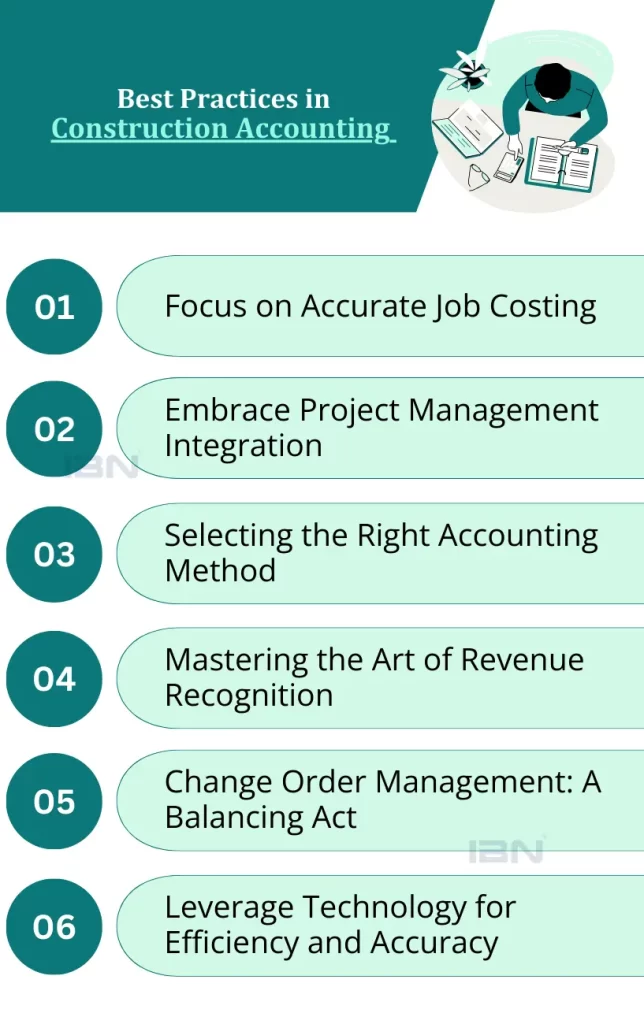Top Construction Accounting Tips for Ensuring Financial Success in Your Projects
Top Construction Accounting Tips for Ensuring Financial Success in Your Projects
Blog Article
Understanding the Importance of Building And Construction Bookkeeping for Effective Task Management

Role of Building Audit
Construction bookkeeping offers as the foundation of economic management in the building industry, guaranteeing that tasks are finished within spending plan and financial objectives are met. construction accounting. This specific accountancy strategy addresses the one-of-a-kind challenges faced in construction projects, including varying project durations, varying costs, and several stakeholders
One of the primary roles of construction bookkeeping is to offer accurate cost estimation and monitoring throughout the task lifecycle. This promotes enlightened decision-making, allowing job managers to readjust sources and timelines efficiently. Additionally, building accountancy improves capital management by keeping an eye on accounts receivable and payable, hence ensuring that funds are readily available for prompt repayments to subcontractors and suppliers.
Additionally, building accounting aids in conformity with market policies and reporting needs. It outfits job managers with the essential monetary information to prepare thorough financial declarations, which are necessary for audits and monetary testimonials. By preserving clear records, building bookkeeping cultivates transparency and liability, important components in constructing count on amongst stakeholders. Ultimately, the function of construction audit prolongs past plain economic tracking; it is indispensable to tactical preparation and functional effectiveness, driving the success of building and construction projects in an affordable landscape.
Key Parts of Building And Construction Bookkeeping

Budgeting develops a financial structure that guides project implementation, allowing supervisors to designate resources successfully and expect potential economic challenges. Exact expense monitoring is necessary for tracking expenditures in real-time, assisting to identify variances between predicted and real expenses. This enables prompt adjustments to keep the task on budget.
Furthermore, financial coverage gives stakeholders with a clear image of the task's financial wellness. Regular reports, such as profit and loss statements and money flow evaluations, facilitate notified decision-making and enhance transparency amongst all parties included.
In addition, compliance with market laws and bookkeeping criteria is essential. This makes sure that financial practices are not just reliable but likewise legal, guarding the organization against lawful effects. By integrating these crucial components, building and construction bookkeeping promotes an organized approach to managing funds, inevitably adding to the effective conclusion of construction jobs.
Advantages for Task Supervisors
Leveraging effective building accountancy methods supplies job managers with a wide range of benefits that enhance both functional performance and monetary oversight. One considerable advantage is improved budget monitoring. Exact tracking of earnings and expenditures enables project supervisors to keep track of financial efficiency in genuine time, making sure jobs stay within budget plan and facilitating timely changes when needed.
In addition, building and construction accountancy improves cash circulation administration, enabling task managers to anticipate economic needs and maximize source allotment. By understanding money inflows and outflows, they can much better manage settlements to employees, vendors, and subcontractors, thereby preventing costly delays.
In addition, robust bookkeeping systems give extensive coverage capabilities. Job supervisors can create reports that use insights into task productivity, expense differences, and resource application. This data-driven method promotes informed decision-making, permitting managers to recognize potential problems proactively and execute rehabilitative measures.
Finally, adherence to construction bookkeeping criteria guarantees compliance with governing and lawful needs, decreasing the threat of disagreements or fines. On the whole, reliable building accountancy furnishes project managers with the devices needed to drive task success, improve stakeholder confidence, and advertise lasting organizational development.
Typical Challenges in Building And Construction Audit
Several project managers encounter significant obstacles in building and construction audit that can prevent task success. Among the main difficulties is the complexity of tracking several job sites, each with distinctive spending plans, timelines, and source allotments. This requires meticulous focus to information, which can be overwhelming without a robust accounting system in area.
In addition, changing material prices and labor prices can complicate budget monitoring, making precise forecasting hard. Project managers usually battle to reconcile these expenses with actual expenditures, bring about prospective financial disparities.
Additionally, construction accounting entails conformity with different regulations, consisting of tax commitments and labor legislations. Browsing these policies can be difficult, particularly for supervisors who might not have a strong accountancy background.
One more substantial difficulty is taking care of money circulation, which is vital in the building sector. Delays in invoicing, settlements from clients, or unforeseen task modifications can develop cash flow scarcities, jeopardizing the job's progression.
Finally, reliable interaction between job supervisors, accountants, and field groups is essential. Misunderstandings can lead to imprecise financial reporting, better complicating project administration initiatives. Addressing these difficulties proactively is necessary for effective building accountancy.

Best Practices for Effective Bookkeeping
While browsing the complexities of building bookkeeping can be difficult, embracing best practices can significantly boost economic administration and job success. One fundamental technique is keeping prompt and exact records. Implementing durable accounting software program tailored to construction tasks can enhance data access, invoicing, and coverage, saving and lowering errors time.
Additionally, developing a clear budget and normal tracking against this spending plan are vital. Utilizing a system of periodic monetary reviews permits job managers to identify variances early, facilitating timely decision-making. It is also vital to separate task costs right into indirect and browse around this web-site straight categories, allowing more clear insights right into success.
An additional best method involves promoting open interaction among all stakeholders. Routine updates and joint discussions regarding economic status can make sure everyone is lined up and informed. Training team in construction-specific audit principles additionally improves competency and precision.
Lastly, ensuring compliance with pertinent audit criteria and laws is non-negotiable. Normal audits and internal testimonials add to transparency and responsibility, building count on with stakeholders and customers. By concentrating on these finest methods, building firms can enhance their accounting processes, ultimately driving task success and financial security.
Verdict
To conclude, construction bookkeeping plays a pivotal duty in guaranteeing successful job management by assisting in exact monetary oversight and improving decision-making. By integrating crucial components such as expense estimate, capital management, and conformity, task supervisors can navigate usual difficulties and utilize ideal practices for effective accounting. Ultimately, a robust building accounting framework not only safeguards budget plan stability however additionally adds to the general monetary health of building jobs, cultivating lasting success within the industry.
By incorporating these key elements, building and construction accounting fosters an organized approach to handling economic sources, ultimately contributing to the successful completion of construction see here jobs.
Accurate tracking of incomes and expenses enables project supervisors to keep an eye on economic performance in actual time, guaranteeing projects continue to be within blog here budget and promoting prompt adjustments when essential.
Project supervisors can produce records that offer insights into project profitability, expense variances, and source usage.Lots of project supervisors run into considerable challenges in building and construction accountancy that can hinder project success. construction accounting. Ultimately, a durable construction audit structure not only safeguards spending plan integrity yet also adds to the total economic health of building projects, fostering sustainable success within the industry
Report this page